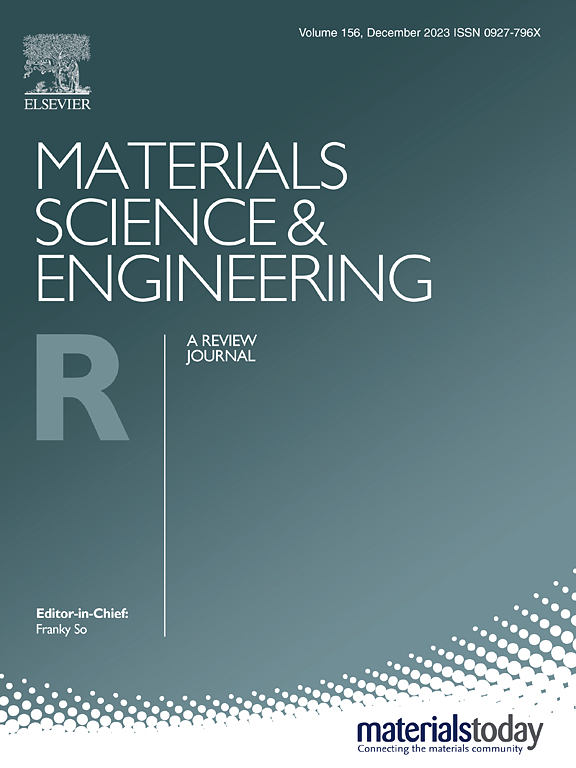具有理想相变性能的锂离子电池热保护用温度可切换电解质
IF 31.6
1区 材料科学
Q1 MATERIALS SCIENCE, MULTIDISCIPLINARY
引用次数: 0
摘要
热失控是锂离子电池(LIBs)的主要安全问题。为了减轻这一担忧,我们基于聚甲基丙烯酸苯乙酯在咪唑基离子液体中的低临界溶液温度(LCST)行为,提出了一种温度可切换电解质(TSE)用于锂离子电池的可逆热保护。我们的研究表明,该电解质的LCST强烈依赖于聚合物与离子液体之间的离子偶极子相互作用。为了实现更可靠的热控制,我们通过调整电解质组成来调节离子-偶极子相互作用,包括咪唑阳离子上的烷基链长度,两种不同离子液体的混合比例,以及聚合物和锂盐浓度。因此,得到的TSE具有最佳的LCST(85°C)和快速的相变速度(85°C时5 秒)。一旦温度超过85°C,由于lst型相变,聚合物迅速从TSE中析出并沉积到电极和分离器表面,形成阻塞层,中断两个电极之间的离子传输,从而停止电极反应。当温度降至85℃以下时,聚合物重新溶解于电解质中,恢复离子传输和电极反应,从而提供可逆热保护,防止电池热失控。这项研究为开发可逆的温度响应电解质和热自我保护的lib提供了新的见解。本文章由计算机程序翻译,如有差异,请以英文原文为准。
Temperature-switchable electrolyte with desirable phase transition behavior for thermal protection of lithium-ion batteries
Thermal runaway is a primary safety concern for lithium-ion batteries (LIBs). To alleviate this concern, we propose here a temperature-switchable electrolyte (TSE) for reversible thermal protection of LIBs, based on the low critical solution temperature (LCST) behavior of poly (phenethyl methacrylate) in imidazolium-based ionic liquids. Our study reveals that the LCST of this electrolyte strongly depends on the ion-dipole interactions between polymer and ionic liquid. To enable a more reliable thermal control, we regulate the ion-dipole interactions by tailoring the electrolyte composition including alkyl chain length on the imidazolium cation, mixing ratio of two different ionic liquids, as well as polymer and lithium salt concentrations. Consequently, the as-obtained TSE demonstrates an optimal LCST (85 °C) and a rapid phase transition speed (within 5 seconds at 85 °C). Once the temperature exceeds 85 °C, the polymer rapidly precipitates from the TSE and deposits onto the electrode and separator surfaces due to the LCST-type phase transition, forming a blocking layer to interrupt ion transport between the two electrodes and thereby to halt electrode reactions. When the temperature drops below 85 °C, the polymer re-dissolves in the electrolyte to resume ion transport and electrode reactions, thus providing reversible thermal protection and preventing the battery from thermal runaway. This study offers new insights for developing reversible temperature-responsive electrolytes and therefore thermally self-protected LIBs.
求助全文
通过发布文献求助,成功后即可免费获取论文全文。
去求助
来源期刊

Materials Science and Engineering: R: Reports
工程技术-材料科学:综合
CiteScore
60.50
自引率
0.30%
发文量
19
审稿时长
34 days
期刊介绍:
Materials Science & Engineering R: Reports is a journal that covers a wide range of topics in the field of materials science and engineering. It publishes both experimental and theoretical research papers, providing background information and critical assessments on various topics. The journal aims to publish high-quality and novel research papers and reviews.
The subject areas covered by the journal include Materials Science (General), Electronic Materials, Optical Materials, and Magnetic Materials. In addition to regular issues, the journal also publishes special issues on key themes in the field of materials science, including Energy Materials, Materials for Health, Materials Discovery, Innovation for High Value Manufacturing, and Sustainable Materials development.
 求助内容:
求助内容: 应助结果提醒方式:
应助结果提醒方式:


